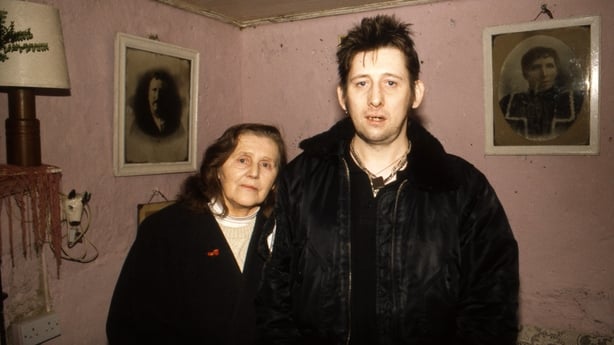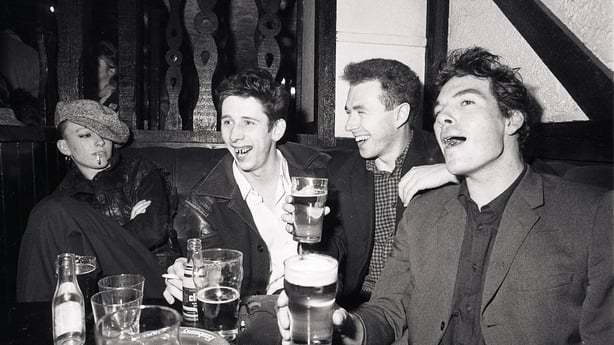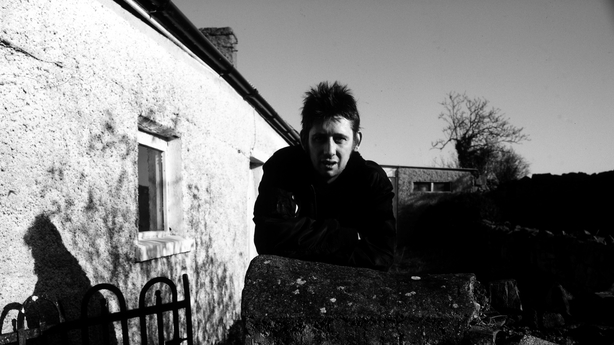Back in 2001 I spent the guts of a day with Shane MacGowan. I was working as a freelance journalist at the time in Tipperary and the midwest.
We met at his home at Carney Commons in north Tipperary, and the interview came ahead of 'The Popes' gig at the Ned o' the Hill festival at Upperchurch just on the outskirts of Thurles.
MacGowan spoke about everything, from his life growing up between England and Ireland, how he always saw publicity as a positive thing no matter what, and how his home in Carney Commons was at the heart of his musical inspirations.
Here is that interview:
After leaving Nenagh and travelling the back roads of one of the most remote places in north Tipperary, I found myself standing at the white glossed door of a three hundred-and-fifty-year-old cottage with a notebook clutched tightly in my hand.
Rumours of an unaccommodating defensive rocker, who despises all journalists, came to mind and worries of a disastrous interview played nervously on my mind.
Following a loud knock, the glossed door creaked open.
"Come in", prompted a voice, "he's in there".
Directed by MacGowan’s manager, I turned into an old parlour. Sitting, watching a documentary about film director Martin Scorsese, was the pale figure of Shane MacGowan - Tipperary’s resident folk legend.
As the conversation flowed, worries of a disastrous interview dissipated, because MacGowan proved himself to be a respectful gentleman worthy of being called a scholar, intellectual and caring person.
To MacGowan, time was not a difficulty, as he explained, during a marathon conversation which lasted over four hours, about his past, his future and his healthy regard for the media.
This rocker was clear on one thing: Tipperary is his home, at Carney Commons, the home of his forefathers, where he will spend the rest of his life.
The pebble-dashed romantic cottage, equipped with a sodded turf roof, presumably from the famine era, now covered with galvanize, consists of a kitchen with sit in open fire and parlour holds memories of times past for MacGowan.

"I will stay here for the rest of my life. This has always been my home. How ever far I wander this is where I belong," says MacGowan as he inhales deeply from a freshly lit cigarette.
"This is my home this is the only place where I ever lived in and it is where I am living now and it is the last place that I will ever live," he adds.
"My parents were living here [in Silvermines village] and I wanted to come back full time. I was sick of living in London and travelling around. I still travel around the world a fair bit but it was that I was basically sick of London. I never really liked the place."
MacGowan in many fans' eyes is a modern Irish folk hero, a troubled rogue responsible for great musical exploits and lyrical passion. But to him, he views his status in a more modest manner.
"I am a modern Irish dance band leader and bar singer and a writer," he says.
"I don't see myself as anything more. I am a lucky f****r because there are hundreds of people more talented than me playing around the country in bars who, God help them, will never get anywhere".
MacGowan's success began in an unlikely place. As the 1970s was in the throes of the anarchist punk movement, he began to gain prominence within London’s musical circles.
There in 1976 Shane became attracted to rebellious fast-paced rock 'n' punk music after seeing The Sex Pistols, the first band he says he ever saw. Following in their footsteps eighteen-year-old Shane became a regular at local punk shows and started his own punk band, The Nipple Erectors.
"I actually spent the year before 'The Nips playing in a ballad group in Borrisokane," explains MacGowan, as he describes how he became involved in the punk scene.

"We never had a name, I think we were called the Drunken Assholes or something. We were just playing in bars, but I went back to England at the end of 1975.
"The first band in London I was in was a punk band. The Nipple Erectors, it was called. We started out as a straight copy of The Sex Pistols and then we started playing rock 'n' roll and country pop band kind of stuff".
Since then MacGowan has fronted three bands: The Nips (originally The Nipple Erectors), The Pogues, (originally Pogue Mahone) and Shane MacGowan and the Popes.
"Me and a bunch of like-minded people got together and instead of doing rock covers and pop covers we did Irish stuff that we knew," MacGowan says explaining how the Pogues were set up.
Shane's musical styles have been varied over the past twenty-five years. An amalgamation of punk rock, Irish trad, and ballads has ensured his music has always remained fresh, lively and to the forefront of the Irish music industry.
But his childhood in Tipperary was the main influence on his music.
Although Shane was born in Kent, England in 1957, he spent a lot of his childhood in his native Tipperary.
"I was always going backwards and forwards to London from the time that I was seven.
"When I wasn't at school, I used to spend all my school holidays over here. And then I was going backwards and forwards from here," explains MacGowan
His mother, Therese, grew up at her grandparent's farmhouse at Carney Commons, and three months after Shane's birth the family returned home to Ireland where his childhood was saturated with traditional Irish music.
His Irish home was the boiling pot for Shane’s musical exploits in later years.
His mother's family, the Lynches, were musically renowned in the locality and at the home there was always musical interaction.
"I was brought up here, as much by his grandparents as he was by his parents. My grandmother, all the Lynches were musical and my mum is a Lynch," explains MacGowan. "That is where I get it from."
"We used to have ceilis here at weekends and all night here in the parlour. This is where you would have all the civilised behaviour.
"This was kept for visitors. For the doctor or the priest or for say, anyone who needed to get away from the mayhem out there," says MacGowan, remembering fondly.

"Out there," he adds looking toward the kitchen, "is where all the mayhem would take place".
Even today MacGowan’s family take a great interest in his music. His sister Siobhan, who recorded an album entitled Chariot on Murgatroid Records in 1997, and mother, have in the past performed Fairytale of New York with him and Siobhan has played as a support act to him on numerous occasions.
However, now the home is less busy and MacGowan, in his quiet paradise at Carney Commons, spends his days out of the media spotlight, writing literature and music.
Currently he is writing about Eoin O’Duffy and the Blue Shirts in the 1930s.
"I am trying to write either a novel, historical novel based on the Blue Shirts and O'Duffy", says the forty-three-year-old rocker who continues to write new songs and ballads on his Spanish Guitar and piano.
"The last song that I wrote is a sad little Ballad called Little Irish Blue Shirt Boy. It is a haunting ballad. It is about a broken-hearted mother worrying as she sows the patch onto the Blue Shirt of her little Irish Blue Shirt Boy as he is going out to defend what he believes in," says MacGowan.
His anger and dark humour are the key to his successful song writing abilities.
"I am angry and p***ed off about lots of things" he says, adding the best way to write a song "is to be amused in a very black way and to be angry and bitter".
"In fact, really angry. But the anger is something that is in the past. It is not something that is eating you away and eating you away. It is not baggage anymore but when you perform a song. When you sing the lyrics, when you feel music going through you the anger comes back through you like magic," he says.
"It is a joyous sort of anger. It is anger as an energy it is not hatred or even bitterness it is just anger mixed with - 'Ah! let's have a good time.
However, in the past MacGowan’s antics, lifestyle and anger have been covered, sometimes to the extreme, by the media. But Shane believes the press have not "given him a rough ride".
"They give me loads of publicity. Bad publicity is great. They love bad publicity and I love any publicity. So if they think that I am an awful person and want to keep writing about it all the time that means that I am in the papers all the time, on the telly all the time, on the radio all the time", says the media-wise performer.
"Everyone knows who I am. Everyone knows what I do, what I look like. The more chance that there is of people coming along to a show or buying a record. There really is no such thing as bad publicity".
He is never hurt by reports in newspapers but he worries about the effect they have on his parents, relations and friends.
"I don't get upset, my parents get upset. An awful lot of people get upset because they don't really know what is going down.
"Being Irish you have relatives and friends all over the world and if they read in the paper that you are on deaths door because you are drinking eighteen gallons of rat poison a day or something people forget that you should never believe the press.
"I don't believe that the Irish people believe the press because if the Irish people did believe the press I would have been stoned in the streets by outraged lunatics.
"How come I have everyone from six-year-old kids to ninety-year-old grannies coming up to me for autographs all the time?
"Because they don't believe it and once more they don't f*****g care. I am not doing harm to anyone else and obviously I couldn't be taking loads of drugs and all that drink or I would be dead.
"I am 43 for God's sake, how many years have they been saying that 'that guy is going to be dead in a year’."







